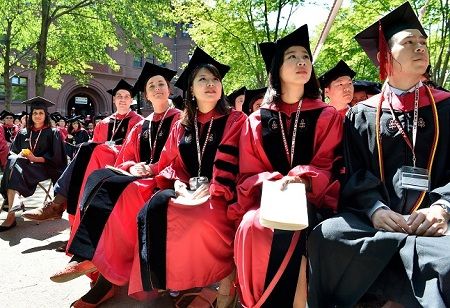Tensions between China and the United States are increasingly affecting higher education, as an increase in student visa cancellations for Chinese nationals creates confusion and fear among international students. Beijing has made a formal advisory warning students of the dangers of studying in the U.S., coming at the same time as reports of cancelled visas and increased scrutiny, particularly among those studying STEM programs.
The Chinese Ministry of Education warning on Wednesday called students to 'fully consider risks' in going to study in the U.S., a new turn in the continuing diplomatic and trade tensions between the two superpowers. It was a replica of the same kind of advisory in 2019 in the tariff war of the Trump administration against China. This came shortly after new tariffs were imposed by the U.S. on Chinese imports, which reignited the tensions between the two.
The effects of these trends are being sharply felt by Chinese students, who have traditionally been the largest contingent of international students in the U.S. Chinese nationals alone brought $14.3 billion to the U.S. economy through education-related travel alone in 2023, as per the U.S. Bureau of Economic Analysis. This totaled almost one-third of all spending by international students in the United States, reinforcing the critical part that these individuals have in American universities' fiscal landscape. The U.S. recorded a service surplus of $32 billion in 2024 with China the bulk of this resulting from education at the post-secondary level.
That pillar, however, is now strained. Over a dozen Chinese students reported to The Wall Street Journal that their student visas were unilaterally revoked without any warning. Some claimed they were singled out for seemingly trivial offenses like traffic tickets. An engineering student studying in Pennsylvania was shocked at the absence of communication and transparency. "We pay too much money to undergo this kind of nightmare", he complained.
For others, the fear goes beyond bureaucracy. Song, a New York-based student, said she has started going through her social media past for anything that could have raised a red flag. "I never thought I would be afraid of what I posted here in America", she said. Her family has since urged her to go back home amid increasing uncertainty.
In a unusual courtroom victory, Xiaotian Liu, a graduate student at Dartmouth College, won his case to reverse the cancellation of his visa in federal court. Assisted by the ACLU of New Hampshire, Liu claimed he complied with all US laws and was subject to deportation without any explanation. The ruling to reinstate his visa is a small but meaningful triumph for international students who are subject to arbitrary enforcement.
The recent crackdown is a replica of the Trump administration policy of tightening screws on Chinese nationals, especially in high-risk areas such as science and technology. In 2020, the United States canceled more than 1,000 Chinese student visas under national security grounds related to school research. The latest spate also seems to be following the same trend, with STEM students back in the limelight.
Piling on the pressure, legislators are demanding more scrutiny. In February, Rep. John Moolenaar, who heads the House Select Committee on China, asked the nation's premier research universities, including Stanford and Carnegie Mellon, for specifics on the number of Chinese students enrolled in federally sponsored STEM programs. Chinese nationals already account for 16% of all graduate students in American science and engineering programs, according to a study at Johns Hopkins.
At the same time, changing global forces have also reshaped student flows. Last academic year, India became the top sender of international students in the U.S., ahead of China, with more than 331,000 students to China's 277,000. The change is driven by pandemic disruptions, China's decelerating economy, as well as rising geopolitical tension.
Experts are cautioning that the long-term effect of diminished Chinese enrollment will be harmful. Migration Policy Institute's Julia Gelatt stressed the threat to the U.S.'s innovation base. "Cutting off that source of innovation and strength could hurt our economic vitality as a country", she said.
As diplomatic tensions keep climbing, the previously strong bridge of education between China and America hangs in the balance possibly changing the face of global academia for years to come.

